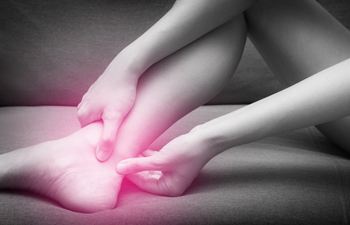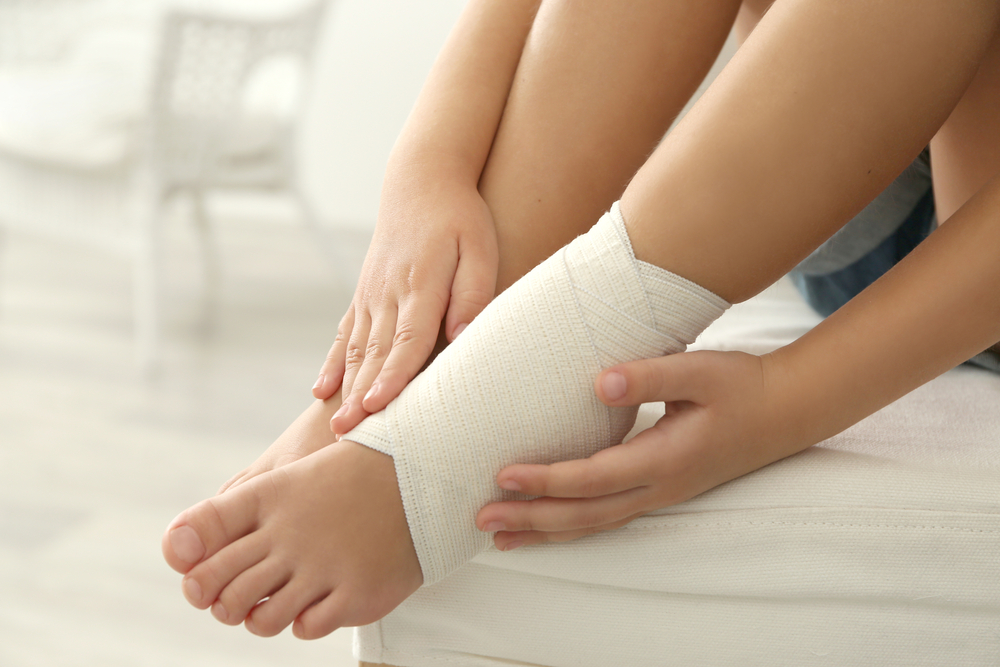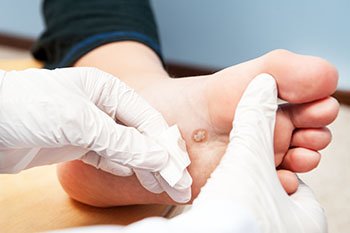Items filtered by date: September 2020
Why Do I Have an Ingrown Toenail?
 If you’ve noticed your toenail has grown into the surrounding skin of your nail, it’s very possible that you may be dealing with an ingrown toenail. Ingrown toenails can be uncomfortable and often painful if left untreated. You may be wondering how did this happen? There are a few reasons why an ingrown toenail may develop. Common causes may include trauma to the affected toenail, such as stubbing the toe, wearing shoes that are too tight, cutting your toenails too short, and cutting your toenails on an angle. To ensure that an infection does not develop, please seek the care of a podiatrist to help you with treatment.
If you’ve noticed your toenail has grown into the surrounding skin of your nail, it’s very possible that you may be dealing with an ingrown toenail. Ingrown toenails can be uncomfortable and often painful if left untreated. You may be wondering how did this happen? There are a few reasons why an ingrown toenail may develop. Common causes may include trauma to the affected toenail, such as stubbing the toe, wearing shoes that are too tight, cutting your toenails too short, and cutting your toenails on an angle. To ensure that an infection does not develop, please seek the care of a podiatrist to help you with treatment.
Ingrown toenails can become painful if they are not treated properly. For more information about ingrown toenails, contact Jordan S. Steinberg, DPM of Florham Park Podiatry . Our doctor can provide the care you need to keep you pain-free and on your feet.
Ingrown Toenails
Ingrown toenails occur when a toenail grows sideways into the bed of the nail, causing pain, swelling, and possibly infection.
Causes
- Bacterial infections
- Improper nail cutting such as cutting it too short or not straight across
- Trauma to the toe, such as stubbing, which causes the nail to grow back irregularly
- Ill-fitting shoes that bunch the toes too close together
- Genetic predisposition
Prevention
Because ingrown toenails are not something found outside of shoe-wearing cultures, going barefoot as often as possible will decrease the likeliness of developing ingrown toenails. Wearing proper fitting shoes and using proper cutting techniques will also help decrease your risk of developing ingrown toenails.
Treatment
Ingrown toenails are a very treatable foot condition. In minor cases, soaking the affected area in salt or antibacterial soaps will not only help with the ingrown nail itself, but also help prevent any infections from occurring. In more severe cases, surgery is an option. In either case, speaking to your podiatrist about this condition will help you get a better understanding of specific treatment options that are right for you.
If you have any questions please feel free to contact our office located in Florham Park, NJ . We offer the newest diagnostic and treatment technologies for all your foot and ankle needs.
Are Plantar Warts Contagious?
Plantar warts are warts that develop on the bottom of the feet. These warts are caused by the human papillomavirus (HPV), a contagious virus that infects the top layer of skin. HPV typically enters the body through broken skin, and warts are spread through direct contact with the virus. Sharing personal items that can harbor the virus, such as towels, shoes, socks, and razors can cause an infection. If you already have a wart, you can also reinfect yourself by touching the wart and then touching another part of your body. Warts often take months to develop after you have come in contact with HPV, so it is important to prevent HPV infections in the first place. Some prevention strategies include not sharing personal items, keeping the feet dry, and wearing shoes when walking through public areas or on warm, moist surfaces, like those at a public swimming pool. For more information about plantar warts, consult with a podiatrist.
Plantar warts can be very uncomfortable. If you need your feet checked, contact Jordan S. Steinberg, DPM from Florham Park Podiatry . Our doctor will assist you with all of your foot and ankle needs.
About Plantar Warts
Plantar warts are the result of HPV, or human papillomavirus, getting into open wounds on the feet. They are mostly found on the heels or balls of the feet.
While plantar warts are generally harmless, those experiencing excessive pain or those suffering from diabetes or a compromised immune system require immediate medical care. Plantar warts are easily diagnosed, usually through scraping off a bit of rough skin or by getting a biopsy.
Symptoms
- Lesions on the bottom of your feet, usually rough and grainy
- Hard or thick callused spots
- Wart seeds, which are small clotted blood vessels that look like little black spots
- Pain, discomfort, or tenderness of your feet when walking or standing
Treatment
- Freezing
- Electric tool removal
- Laser Treatment
- Topical Creams (prescription only)
- Over-the-counter medications
To help prevent developing plantar warts, avoid walking barefoot over abrasive surfaces that can cause cuts or wounds for HPV to get into. Avoiding direct contact with other warts, as well as not picking or rubbing existing warts, can help prevent the further spread of plantar warts. However, if you think you have developed plantar warts, speak to your podiatrist. He or she can diagnose the warts on your feet and recommend the appropriate treatment options.
If you have any questions please feel free to contact our office located in Florham Park, NJ . We offer the newest diagnostic and treatment technologies for all your foot and ankle needs.
What is Achilles Tendinopathy?
 The Achilles tendon is the band of tissue that connects the back of the calf muscle to the heel bone. Achilles tendinopathy occurs when the Achilles tendon is stressed and experiences very small tears or other damage. “Tendinitis” refers to fresh damage, usually within 10 days, and once the inflammation has gone away and only the tears remain, “tendinopathy” occurs. Those suffering from Achilles tendinopathy typically have severe pain and weakening around the ankle. Symptoms usually worsen during physical activity, but relief may be found with heat or ice packs. Those who are experiencing Achilles tendinopathy should consult with a podiatrist. Pain management is the first step, and orthotics, ankle braces or walking boots may also be necessary.
The Achilles tendon is the band of tissue that connects the back of the calf muscle to the heel bone. Achilles tendinopathy occurs when the Achilles tendon is stressed and experiences very small tears or other damage. “Tendinitis” refers to fresh damage, usually within 10 days, and once the inflammation has gone away and only the tears remain, “tendinopathy” occurs. Those suffering from Achilles tendinopathy typically have severe pain and weakening around the ankle. Symptoms usually worsen during physical activity, but relief may be found with heat or ice packs. Those who are experiencing Achilles tendinopathy should consult with a podiatrist. Pain management is the first step, and orthotics, ankle braces or walking boots may also be necessary.
Achilles tendon injuries need immediate attention to avoid future complications. If you have any concerns, contact Jordan S. Steinberg, DPM of Florham Park Podiatry . Our doctor can provide the care you need to keep you pain-free and on your feet.
What Is the Achilles Tendon?
The Achilles tendon is a tendon that connects the lower leg muscles and calf to the heel of the foot. It is the strongest tendon in the human body and is essential for making movement possible. Because this tendon is such an integral part of the body, any injuries to it can create immense difficulties and should immediately be presented to a doctor.
What Are the Symptoms of an Achilles Tendon Injury?
There are various types of injuries that can affect the Achilles tendon. The two most common injuries are Achilles tendinitis and ruptures of the tendon.
Achilles Tendinitis Symptoms
- Inflammation
- Dull to severe pain
- Increased blood flow to the tendon
- Thickening of the tendon
Rupture Symptoms
- Extreme pain and swelling in the foot
- Total immobility
Treatment and Prevention
Achilles tendon injuries are diagnosed by a thorough physical evaluation, which can include an MRI. Treatment involves rest, physical therapy, and in some cases, surgery. However, various preventative measures can be taken to avoid these injuries, such as:
- Thorough stretching of the tendon before and after exercise
- Strengthening exercises like calf raises, squats, leg curls, leg extensions, leg raises, lunges, and leg presses
If you have any questions please feel free to contact our office located in Florham Park, NJ . We offer the newest diagnostic tools and technology to treat your foot and ankle needs.
Common Reasons for Ankle Pain
 Your ankle can hurt for a variety of reasons. The most common cause of ankle pain is an injury, such as a strain or a sprain. A strain is an injury to the muscle or tendon of the ankle, while a sprain is an injury to the ligament. Both types of injuries can vary in severity and may cause pain or discomfort, tenderness, and swelling. Other possible injuries of the ankle include Achilles tendon ruptures or ankle fractures, which are more severe in nature. Several types of arthritis can affect the ankle, including osteoarthritis, rheumatoid arthritis, and gout. An infection, in which bacteria enters the skin or the joint around the ankle can cause pain and swelling, in addition to fever and fatigue. Flat feet or fallen arches may lead to ankle pain as well. If you are experiencing ankle pain, it is recommended that you see a podiatrist for a proper diagnosis and to begin the best course of treatment that is right for you.
Your ankle can hurt for a variety of reasons. The most common cause of ankle pain is an injury, such as a strain or a sprain. A strain is an injury to the muscle or tendon of the ankle, while a sprain is an injury to the ligament. Both types of injuries can vary in severity and may cause pain or discomfort, tenderness, and swelling. Other possible injuries of the ankle include Achilles tendon ruptures or ankle fractures, which are more severe in nature. Several types of arthritis can affect the ankle, including osteoarthritis, rheumatoid arthritis, and gout. An infection, in which bacteria enters the skin or the joint around the ankle can cause pain and swelling, in addition to fever and fatigue. Flat feet or fallen arches may lead to ankle pain as well. If you are experiencing ankle pain, it is recommended that you see a podiatrist for a proper diagnosis and to begin the best course of treatment that is right for you.
Ankle pain can be caused by a number of problems and may be potentially serious. If you have ankle pain, consult with Jordan S. Steinberg, DPM from Florham Park Podiatry . Our doctor will assess your condition and provide you with quality foot and ankle treatment.
Ankle pain is any condition that causes pain in the ankle. Due to the fact that the ankle consists of tendons, muscles, bones, and ligaments, ankle pain can come from a number of different conditions.
Causes
The most common causes of ankle pain include:
- Types of arthritis (rheumatoid, osteoarthritis, and gout)
- Ankle sprains
- Broken ankles
- Achilles tendinitis
- Achilles tendon rupture
- Stress fractures
- Bursitis
- Tarsal tunnel syndrome
- Plantar fasciitis
Symptoms
Symptoms of ankle injury vary based upon the condition. Pain may include general pain and discomfort, swelling, aching, redness, bruising, burning or stabbing sensations, and/or loss of sensation.
Diagnosis
Due to the wide variety of potential causes of ankle pain, podiatrists will utilize a number of different methods to properly diagnose ankle pain. This can include asking for personal and family medical histories and of any recent injuries. Further diagnosis may include sensation tests, a physical examination, and potentially x-rays or other imaging tests.
Treatment
Just as the range of causes varies widely, so do treatments. Some more common treatments are rest, ice packs, keeping pressure off the foot, orthotics and braces, medication for inflammation and pain, and surgery.
If you have any questions, please feel free to contact our office located in Florham Park, NJ . We offer the newest diagnostic and treatment technologies for all your foot care needs.


